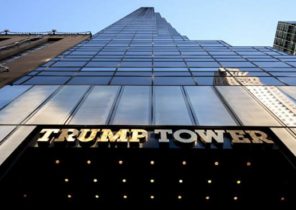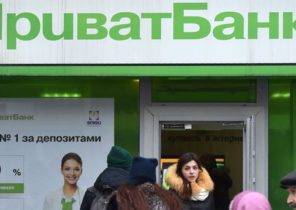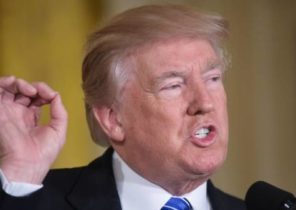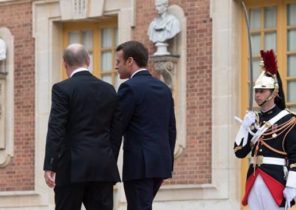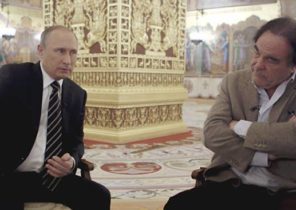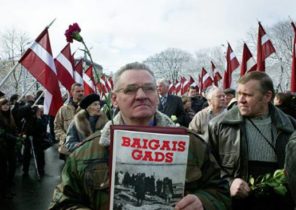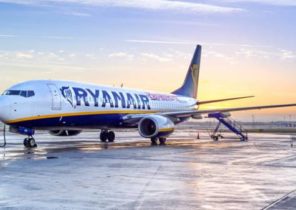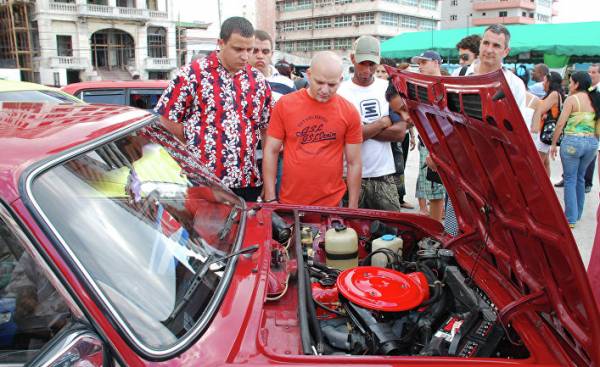
Sometimes the wheels of history spinning very slowly. The most popular route to experience the Cubans — not Miami. He is in Moscow, over 6 thousand miles from Cuba.
The stricter border control in the United States and the growth of income from relatives living abroad, led to the fact that lately more and more Cubans go to Russia, the only major country that still does not require visas for islanders. Cuban buyers 13 hours fly by planes “Aeroflot”, working since the days of the Soviet Union, and not to see the Kremlin or Red square. Back to suffering from a shortage of “the island of the Communists,” they’re carrying bags with jeans, fancy goods and car parts.
“The flow of Cubans go, never knowing Russian, only to be bought, — told Treeto Ricardo (Ricardo Trieto), a Cuban engineer, who studied in Russia and now performs the role of an interpreter for customers, fellow countrymen coming to the Moscow flea markets. Is very beneficial: what would you here or bought the house you will be able to resell it more expensive.”
The US trade embargo against Cuba remains in force, despite the fact that President Barack Obama last year eased restrictions on travel by Americans to Cuba, and in 2015 has opened a U.S. Embassy in Havana after more than half a century, the absence of any relationship.
President Donald trump has said he will abandon the Cuban initiatives of Mr. Obama. All this helped to revive trade relations between Russia and Cuba, reminiscent of the cold war.
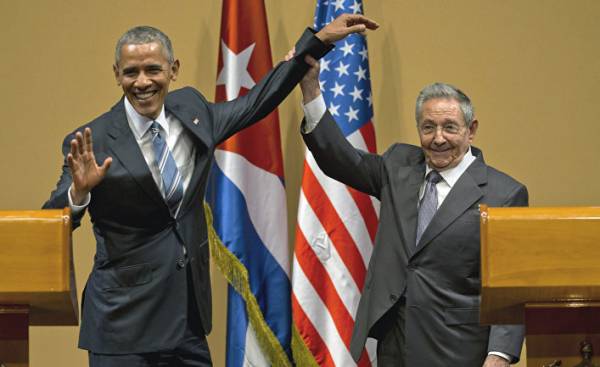 © AP Photo, Ramon Eropean Barack Obama and Cuban President Raul Castro
© AP Photo, Ramon Eropean Barack Obama and Cuban President Raul Castro
Regarding the demand for automotive spare parts in Cuba. Given the trade embargo, most cars in Cuba or made in America cars of the 1950s than the clunkers of the Soviet era. The old model of “Harmony” and “Neve”, square-shaped that long ago has almost disappeared from the streets of Moscow.
In Cuba, their position is still very strong. In any case, until they begin to break down and require new parts, the lack of which can bring someone impressive profits.
In Moscow in a Moskvich 1980, the year another Korobkovsky a relic of the Soviet era, can fetch about $ 500. On suffering from the embargo Cuba he can leave — neither more nor less — for 14 thousand dollars, say Cuban taxi drivers. Is fueling thriving handicraft industry, specializing in spare parts received with the car a showdown in the Caribbean.
On growing used car market “southern port” in the South of Moscow up to 40% of profit comes from Cuban buyers, according to traders. “Without them we would have gone bankrupt,” — says the seller of Timur Muradyan.
Cloudy winter morning a dozen Cubans dressed in ridiculous sitting beanie and grey puffy jacket, go to the market for metal containers filled with rusty car parts. Wearing more clothes, and skin darker than most of the locals that immediately gives their origin, sellers who welcome them with cries of “hola, amigo”.
“Here I can buy everything I need, it’s incredible,” says Alejandro, who came from Havana to get parts for the tractor.
Waving his hands and poking at calculators with frozen fingers, the Cubans traded, nakupa on thousands of dollars that most local would seem useless junk.
“They buy up all the weight for Russian trucks and tractors, don’t even look for parts and what model to take, says Mr. Muradyan. — No matter what they bought, houses will be able to resell it for profit”.
According to the owners of the tents, a group of Cubans on the market spends from 3 to 7 thousand dollars. Enormous amounts of money for the residents of the island, where the average salary is approximately $ 25 per month.
At home in Cuba, entire villages gather “messenger” to send him on shopping in Moscow, often using remittances from relatives in Miami or Madrid. The inhabitants of the village of Rodas, located in the heart of the sugar belt of Cuba, saying that they cane simply have rotted in the fields without these annual trips to Moscow, due to which they get parts for their Soviet tractors of the 1970-ies.
Some of those employees, the Shuttle industry is one of those tens of thousands of Cubans who studied in the universities of the Soviet Union. They studied engineering, medicine and science, and then returned home to engage in the development of his Communist homeland. But when in 1991 the Soviet Union collapsed and its subsidies ceased, many of them suddenly found themselves forced to work as waiters or security guards for minimum wage.
Who studied in the Soviet Union, the Cuban engineer Raul KURO (Raul Curo) returned to live in Russia a few years ago. He bought a taxi and became part of the thriving Moscow’s Cuban expatriate community, serving buyers from the island. Mr. KURO meets them at the airport and driving through the city flea markets, translating for them and helping bargain.
“Everybody here loves Cubans. It has always been since the days of Khrushchev,” — says Mr. KURO, remembering that the Soviet leader, who almost triggered a nuclear Armageddon, having concluded the Alliance with Cuba in 1960, and placing missiles there.
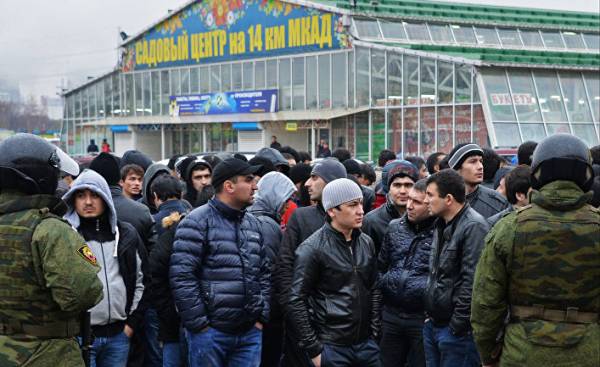 © RIA Novosti, Ilya Pitalev | Go fotobanka checks in the Moscow market “Gardener”
© RIA Novosti, Ilya Pitalev | Go fotobanka checks in the Moscow market “Gardener”
During the low season, the interpreter Mr. Triet makes a living by giving Spanish lessons to the Armenian and Azerbaijani owners of the tents at the city flea markets. Others make ends meet by teaching salsa in the Nightclubs of Moscow, for example, in “Old Havana”.
The majority of the Cuban buyers come to Moscow for about a week, and spend the whole day, serta flea markets to score 260 pounds of goods that you can bring with you on the plane for an additional fee.
They borrow shoes and warm winter jackets from friends and relatives, and sleep on the double beds in the cramped apartments of the Soviet era, owned by Cuban expatriates.
“I have never in my life have I been cold, but I gradually get used,” says the buyer Abelito. He said that his first purchase was the warmest jacket he could find at a flea market “Gardener” with an area of 15 acres.
When entering budget trade-exhibition complex “Moscow” in Lublin is a Cuban dining room, decorated with images of the lush rolling hills of the island and a photo of Vladimir Putin with the late Cuban leader Fidel Castro. Cuban cooks in cheap home-cooked meals of rice, beans and shredded pork.
Shopping centre offers interpreting services for groups from Cuba and Cuban immigrants working in low-cost jewelry kiosks Mall. Azerbaijan the owner of the kiosk in broken Spanish traded with a group of Cubans over the stack of jeans.
“They by and large live in the market, — says the taxi driver, Mr. t about his fellow-shuttles. Come, buy stuff and leave. A couple of months come again.”

